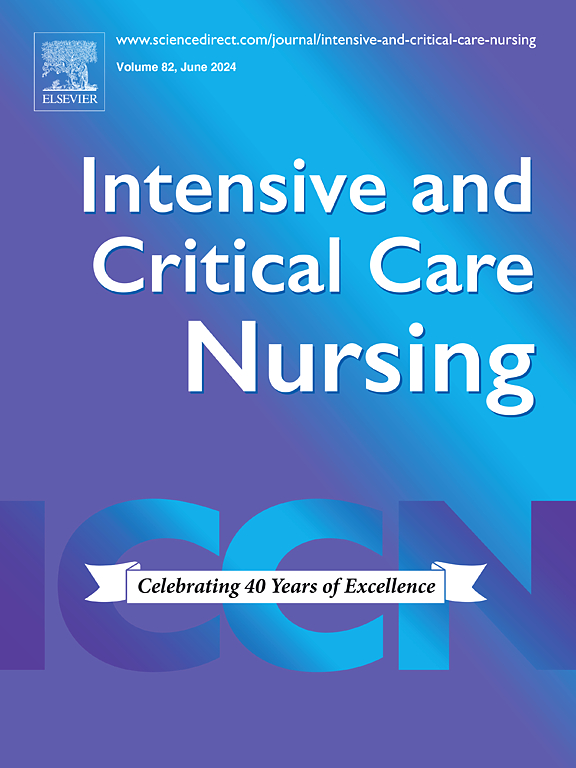Families’ experiences with a novel nurse-led family support intervention in adult intensive care units: A qualitative thematic analysis
IF 4.7
2区 医学
Q1 NURSING
引用次数: 0
Abstract
Background
Families of critically ill patients face considerable distress during and after their significant others’ intensive care unit (ICU) stay. To better address families’ needs and to mitigate high burden and post-ICU adverse health outcomes, we implemented a novel family support intervention (FSI) in ICUs as part of a clinical trial. The FSI consists of three core components (engaging & liaising, supporting, communicating), delivered by an ICU family nurse from admission to the post-ICU phase and have shown to improve quality of care in the ICU.
Objectives
The aim of this study was to explore and understand families’ experiences with and their perspectives on the benefits of the FSI.
Design
A multi-center, qualitative thematic analysis study, embedded within the Family in Intensive Care UnitS (FICUS) cluster-randomized clinical trial.
Participants
Family members (n = 17) and ICU survivors (n = 2) of 16 families from eight ICUs, allocated to the FICUS intervention group in the German speaking part of Switzerland.
Methods
16 semi-structured individual (n = 14), dyadic (n = 1) or group (n = 1) interviews were held from October-December 2023, between three and six months after patients’ ICU discharge. Reflexive thematic data analysis with an inductive approach was used.
Results
Three themes and nine subthemes were identified. The three themes included having individual family needs met (information and education, coordinative and practical help, and emotional support), skilled care (authentic interest, skilled communication, and knowledge and expertise) and experiencing benefits (feeling assured and oriented, reduced burden and stress, and ability to manage and cope as a family).
Implications
Findings highlight the importance of individualized, skilled and strengthening ICU care tailored to families’ needs and situations, which follows families into the post-ICU phase. Families experienced the FSI as a beneficial model of care for both individual and family well-being. ICUs should consider building capacity to ensure structured family care.
在成人重症监护病房,一种新型护士主导的家庭支持干预的家庭体验:一项定性的专题分析
在重症监护病房(ICU)期间和之后,危重患者的家庭面临相当大的痛苦。为了更好地满足家庭需求,减轻高负担和icu后不良健康结果,我们在icu中实施了一种新的家庭支持干预(FSI)作为临床试验的一部分。FSI包括三个核心组成部分(参与、联络、支持、沟通),由ICU家庭护士从入院到出院阶段提供,并已证明可以提高ICU的护理质量。目的本研究的目的是探索和了解家庭的经验和他们对家庭服务的好处的看法。设计一项多中心定性专题分析研究,嵌入重症监护病房家庭(FICUS)集群随机临床试验。参与者:来自8个ICU的16个家庭的家庭成员(n = 17)和ICU幸存者(n = 2),分配到瑞士德语区的FICUS干预组。方法于2023年10 - 12月,患者出院后3 - 6个月,对16例半结构化个体(n = 14)、双组(n = 1)或组(n = 1)进行访谈。采用归纳方法进行反身性专题数据分析。结果确定了3个主题和9个副主题。这三个主题包括满足个人家庭需求(信息和教育,协调和实际帮助,情感支持),熟练护理(真正的兴趣,熟练的沟通,知识和专业知识)和体验利益(感到放心和定向,减轻负担和压力,以及作为一个家庭管理和应对的能力)。研究结果强调了个性化、熟练和加强针对家庭需求和情况的ICU护理的重要性,这些护理跟随家庭进入后ICU阶段。家庭经历了FSI作为一个有益的模式,照顾个人和家庭幸福。icu应考虑建设能力,以确保有组织的家庭护理。
本文章由计算机程序翻译,如有差异,请以英文原文为准。
求助全文
约1分钟内获得全文
求助全文
来源期刊

Intensive and Critical Care Nursing
NURSING-
CiteScore
6.30
自引率
15.10%
发文量
144
审稿时长
57 days
期刊介绍:
The aims of Intensive and Critical Care Nursing are to promote excellence of care of critically ill patients by specialist nurses and their professional colleagues; to provide an international and interdisciplinary forum for the publication, dissemination and exchange of research findings, experience and ideas; to develop and enhance the knowledge, skills, attitudes and creative thinking essential to good critical care nursing practice. The journal publishes reviews, updates and feature articles in addition to original papers and significant preliminary communications. Articles may deal with any part of practice including relevant clinical, research, educational, psychological and technological aspects.
 求助内容:
求助内容: 应助结果提醒方式:
应助结果提醒方式:


